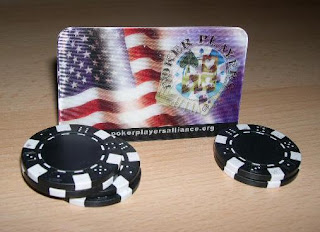 I am a member of the Poker Players Alliance. I joined about a week after the UIGEA was signed into law back in October. Ponied up the twenty bucks and got my t-shirt, lapel pin, and PPA membership card that now rides around in my wallet next to an old laundry receipt, business cards of unremembered origin, and a sadly useless Subway Sub Club card. The membership card is one of those fancy lenticular cards where the image changes when you tilt it back and forth. Symbolizing the PPA’s intention to create change, perhaps? Or to create groovy-lookin’ cards.
I am a member of the Poker Players Alliance. I joined about a week after the UIGEA was signed into law back in October. Ponied up the twenty bucks and got my t-shirt, lapel pin, and PPA membership card that now rides around in my wallet next to an old laundry receipt, business cards of unremembered origin, and a sadly useless Subway Sub Club card. The membership card is one of those fancy lenticular cards where the image changes when you tilt it back and forth. Symbolizing the PPA’s intention to create change, perhaps? Or to create groovy-lookin’ cards.The membership number on the back of the card suggests I was among the first 20,000 to join. (I suppose that might be true.) Today the PPA is reporting a membership of over 330,000 -- impressive, to be sure, although with free sign-ups via the internet there are several reasons one might question the legitimacy of that figure. Still, anyone who joins is -- theoretically -- of voting age and thus of tangible relevance to elected officials.
There’s been a lot of speculation about the PPA and its efficacy as a grass-roots, agenda-affecting organization. Some of the doubts are well-founded, though I’m going to give the PPA some credit here for doing what it can to marshall together a group whose numbers might well impress those who need impressing. Thursday’s webcast “chat” with Chairman of the Board Alphonse D’Amato clearly demonstrated the PPA’s number one priority right now is to attract more members into the fold. The webcast was open to anyone -- not just those of us with the fancy cards in our wallets -- and amounted to a thirty-minute rallying cry. (The PPA has posted an excerpt of the webcast over on YouTube; they intend to post the entire show in the near future.)
D’Amato was actually fairly communicative and (for the most part) actually answered the 15-20 questions that had been emailed to him. There was one misstep early on by D’Amato during his opening remarks. After running through the various reasons why the UIGEA is objectionable, he then lamented how people are “now” being arrested for playing poker. A couple of problems, here. For one, D’Amato seemed to imply a causal link between the UIGEA and the arrests of individuals running illegal live poker clubs such as has occurred recently in Cary, North Carolina, Indianapolis, and Atlanta. Obviously not true. The other, equally false implication here is that people are being arrested for playing poker online -- as if that were part of the UIGEA’s purview. I don’t think D’Amato intended either of these connections, but as the group’s spokesperson he should strive to be precise whenever referring to particulars of the present situation.
As I say, from a rhetorical standpoint the webcast amounted to a rallying cry for those already in the fold, and (perhaps) a recruitment tool for those yet to join. Makes sense, since it is fairly apparent that as of today, the PPA is clearly the short stack at the legislative table. As D’Amato mentioned in the webcast, Barney Frank does not intend to make any distinctions on the House floor that would consider poker any differently from other forms of gambling. As I mentioned in that note I added to my last post, this statement indicates to me that we will not be seeing any attempt here in the near term to introduce a poker “carve out” into the UIGEA. One can further surmise that since poker isn’t going to be given any special treatment next week -- or whenever Frank does introduce to Congress the subject of revisiting the UIGEA (reports from week’s end suggest it might in fact be some time before Frank makes his move) -- an organization of poker players, no matter how large, ain’t really part of the discussion. Now that I think about it, the PPA isn’t the short stack -- they’re on the rail.
Which is where they (ahem, I mean “we”) will be staying, it is likely, unless membership grows to something like NRA numbers (i.e., the millions). Even then -- as I’ve said before here -- it is hard to imagine the right to play online poker ever becoming a significant concern of legislators.
There is hope, though. As one 2+2 poster succinctly pointed out this week, “We have to remember that this issue is really a small blip on the national radar. But that fact was what allowed the UIGEA to get ‘passed’ in the first place, and it can be used to get it undone too.” Unnecessary scare quotes aside, the poster has a point. The issue’s relative obscurity may well reduce the stakes (as it were), enabling members of Congress to support a repeal of the dubiously-passed legislation without necessarily facing any meaningful political backlash.
Nifty how these cards work. One wishes the UIGEA could be changed as easily.
No comments:
Post a Comment